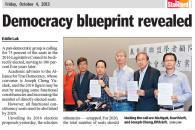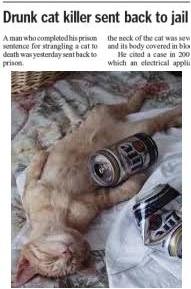Hong Kong is under siege from Mainland kindergarten kids, Mainland special free-trade global financial hub-zones and Mainland pillagers of infant formula, but the struggle for universal suffrage goes on. The city’s Alliance for True Democracy produces a proposal for reform of the 2016 Legislative Council election system. This  follows their earlier suggestions for the 2017 Chief Executive election arrangements. More boisterous pro-dem groups have become preoccupied with the latter, especially the issue of who can nominate candidates, specifically demanding that the Basic Law’s reference to a ‘committee’ doing the job means the entire electorate can take part. The Alliance, in contrast, are taking seriously Legco’s part in the forthcoming constitutional reforms.
follows their earlier suggestions for the 2017 Chief Executive election arrangements. More boisterous pro-dem groups have become preoccupied with the latter, especially the issue of who can nominate candidates, specifically demanding that the Basic Law’s reference to a ‘committee’ doing the job means the entire electorate can take part. The Alliance, in contrast, are taking seriously Legco’s part in the forthcoming constitutional reforms.
Under the status quo, Hong Kong people elect the opposition, not the leadership. As a result, many legislators use what powers they have to indiscriminately obstruct the executive. In theory, the post-2017 legislature will be checking an administration that has a popular mandate. What changes to the Legco election system will best enable it to do that effectively?
The picture is complicated by the existence of functional constituencies. To paranoiacs in Beijing, these seats (or a big bloc of them) form a veto that it can wield in emergencies. But to the political process in Hong Kong, they are a bane: commercial lobbies accustomed to an institutionalized right to override the public interest. The FCs themselves will screech that they must remain intact, but it is not up to them or us; they are shoe-shiners whose fate is purely in the Chinese government’s hands. Will Beijing continue to insist on some sort of veto in Legco, or will run the risk – as it has to consider doing with the CE election – of letting go a bit? (And can it bring itself to disappoint loyalists in the business community?)
The Alliance for True Democracy’s proposals are in the Standard article and in more detail (in Chinese) here. There must be a near-infinite number of permutations of totals of seats, ratios of various constituency types and voting systems. These suggestions come from academics, and are essentially as sensible as they are potentially mind-numbing (though does a city of 7 million really need 90 lawmakers?). Presumably, ex-Chief Secretary Anson Chan’s HK2020 group will offer even more moderate ideas (if they haven’t already – it’s a Friday), while radicals will demand the blatantly impossible. Unless brought to heel by Beijing, pro-business ‘elites’ will quite possibly propose their own buffoonish ways to keep the FCs’ privileges intact, which will be roundly rejected by pretty much everyone else. The Hong Kong government’s proposals, vetted and approved by the central authorities, will aim at a middle ground. With the pro-dems wielding a veto over constitutional bills in Legco (a precaution designed to work against them) and the such-as-it-is threat of Occupy Central, the administration will need to target middle ground that’s not too far from where the milder pro-dems are standing.
We declare the weekend open with a reminder of the extraordinary sophistication and compassion of the Big Lychee’s legal system: while slaughter of a sober feline is of course illegal, a criminal gets an extra heavy sentence for killing a drunk one – off its guard, and thus less able to defend itself. Quite right, too. 

The wording of the Basic Law is sometimes biased against freedom, democracy, the rule of law — as you’d expect from a document written under the close supervision of the butchers of Tiananmen.
Universal suffrage does not mean being free to vote only for corrupt lackeys and abject axxx-lickers: it precludes excluding the halt, the lame, women, those who have bad manners and are under 1 m 60 (note to RTP), people who don’t like dogs or anyone who doesn’t think Mao was the greatest superman in history.
Hemlock’s presentation is, in sum, balanced and perceptive, but the problem in debating with a puppet like CY Leung and his cronies and zombies is that it won’t get you too far.
Have a great weeekend!
Curious to see DAB Chairman Tam Yiu-chung opposing the abolition of the super seats when his party and its allies only secured 2 of them last time against 3 for the pan-dems. Does he know something we don’t?
@PB you beat me too it! The DAB are a wierd mob – i think they just say the opposite even though they are shooting themselves in the foot.
And in other news – I also see in the subStandard they are living up to their usual low journalistic standards, in a small report about some journalist professor (ironic?) complaining about the gweilo who is looking to become VC of HKU. Spouting the usual “he doesn’t know chinese” and the “he doesn’t know Asia” blah blah blah.
But the issue is that the subStandtard thinks this noddy nobody will be questioning the gweilo’s suitability for the job. Well actually subStandard no she wont. She is not on the selection committee – simple as that.
Never let the facts get in the way of a good “beat up on a gweilo” piece.
That moggy was drinking weak, watery Millar Lite.
It deserved to die.
GE, I noticed a similar innuendo, but slightly more subtle, in the SCMP: cannot communicate with staff (who I deduce can’t speak English), not familiar with the local cultural context, and so on.
Having said that, I do pity the non Chinese and indeed the foreign Chinese fresh off the boat with little inkling of local folkways and mores, especially as they usually get jobs the locals don’t want: think culture hub thingy, Hospital Authority, Lantau deathtrap, etc.
In some respects you guess the CCP will dig their heels in for 2016 Legco because it’s likely they’ve painted themselves into a corner on 2017 CE election. Afterall if you allow an Albert or Alan a chance to run (but not to win ) in the last two “races” then you have to allow them to run 2017 (?) However the horror is they now could win.
Whatever the permutations of the alliance you can bet the local liaison office has done theirs and some. So my guess is the FC’s are still with us for some time until, as you correctly state, Beijing informs them there time and usefulness is up. Could they stay after 2020 and act as a block on a democratically elected CE ?
And with the 2016 legco election I do hope the electorate once and for all gives the DAB the electoral kicking that they deserve. Perhaps the trial of the ex CS Raffy Hui will be the touchpaper to realizing what a truly rotten borough the Hong Kong Government has become and they again do something about it as in 2003.
Even if one agrees that the modern form of Western democracy has its faults (pace Churchill), and even if one can imagine a role for sector interests being represented in some via rotten boroughs, either voting or advisory, it still boggles the mind that any sentient human being thinks a community of 7 million would be well-served by a legislative (sic) body of more than, say, 35 representatives. Lee Kwan Yu still has a little gas left in the tank. Can’t we just have him or one of his progeny run the place for a little while? It could hardly be worse.
It’s a cheap trick to look for grammatical mistakes, but if the person concerned is a full professor and head of journalism in an English-medium university, shouldn’t he master the use of the definite article better than:
“Uganda and other parts of developing world”? (http://www.scmp.com/news/hong-kong/article/1324223/peter-mathieson-responds-doubts-over-qualifications-vows-uphold-hku — behind a (rather leaky) paywall)
Are we discussing Uganda? I think we should be told.
@PCC. You jest shurely. The tycoons would throw an oink fest. There’s only room for so many snouts at the trough.
Hong Kong has a lot to learn from the Western democratic tradition. Unfortunately, I am sure that those lessons will be learned… pity, it’s nice living in a place where you aren’t under permanent suspicion.
@Chimp: Not everybody is from the UK or US………..